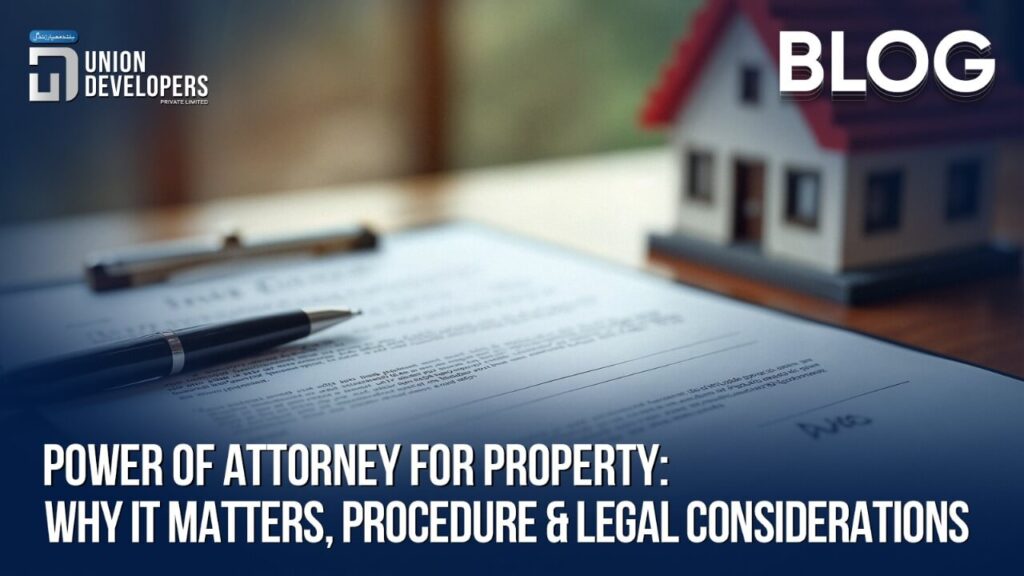A Power of Attorney (PoA) is a legal term & evidence that allows an individual to authorize another person to handle property-related matters. Thus, the designated against act on the owner’s behalf in financial matters, including property transitions.
Whereas an individual refers to the ‘principal’ & another person is known as the ‘attorney. In Pakistan, a PoA for the property is referred to as ‘Mukhtar Nama.’ Hence, it is a legal document that grants someone the authority to sell or manage a property on behalf of the owner.
This comprehensive guide explores in-depth knowledge information on PoA for property, its benefits, legal requirements & risks, and the best practices associated with property-related PoAs in Pakistan.
What Is a Power of Attorney for Property?
A PoA for a property is legal evidence given to a person (agent) to handle your property-related matters in your absence. It allows the designated agents to handle the selling, renting & other aspects of the property in your absence.
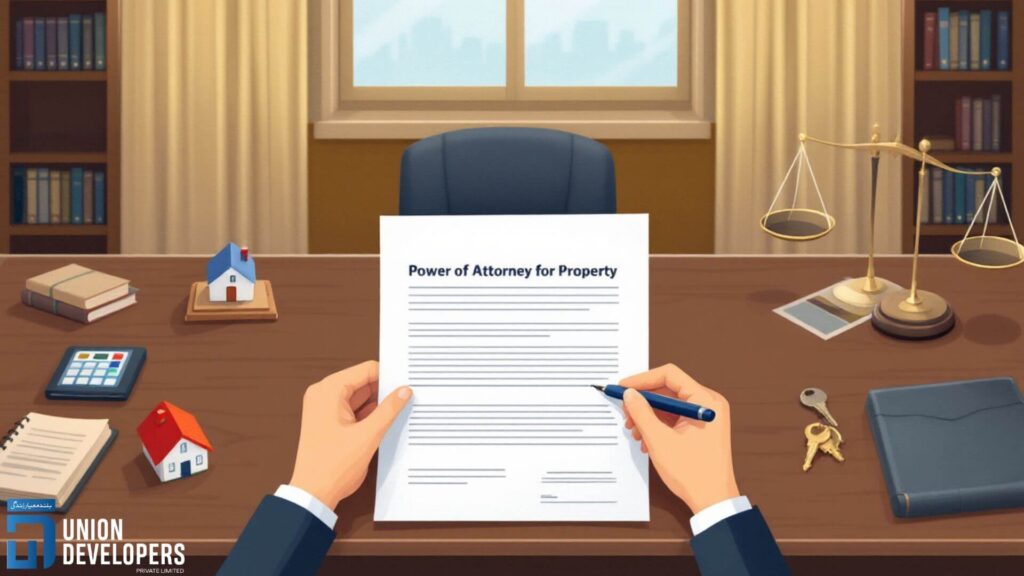
A Power of Attorney for property is important when you’re away, unable to manage your affairs, or facing health-related issues.
Legal Definition of Power of Attorney
The PoA in ‘Power of Attorney Act of 1882 under Section 2’ is defined as
“The donee [Executant] of a power-of-attorney may, if they think fit, execute or do any assurance, instrument or thing in and with his own name and signature, and his own seal, where sealing is required, by the authority of the donor of the power; and every assurance, instrument, and thing so executed and done, shall be as effectual in law as if it had been executed or done by the donee of the power in the name, and with the signature and seal, of the donor thereof.”
Why Power of Attorney for Property Legally Matters?
There are several reasons why a PoA for the property is crucial for handling property-related issues.
1. Overseas Pakistanis
Enables them to manage or sell property in Pakistan without being physically present.
2. Elderly or Incapacitated Individuals
It allows trusted individuals to handle property matters on their behalf.
3. Legal & Financial Transactions
A Power of Attorney for property facilitates the smooth processing of property-related legal & financial matters.
Legal Terminologies Related to Power of Attorney
In the legal context of Power of Attorney, key terms include the following terminologies.
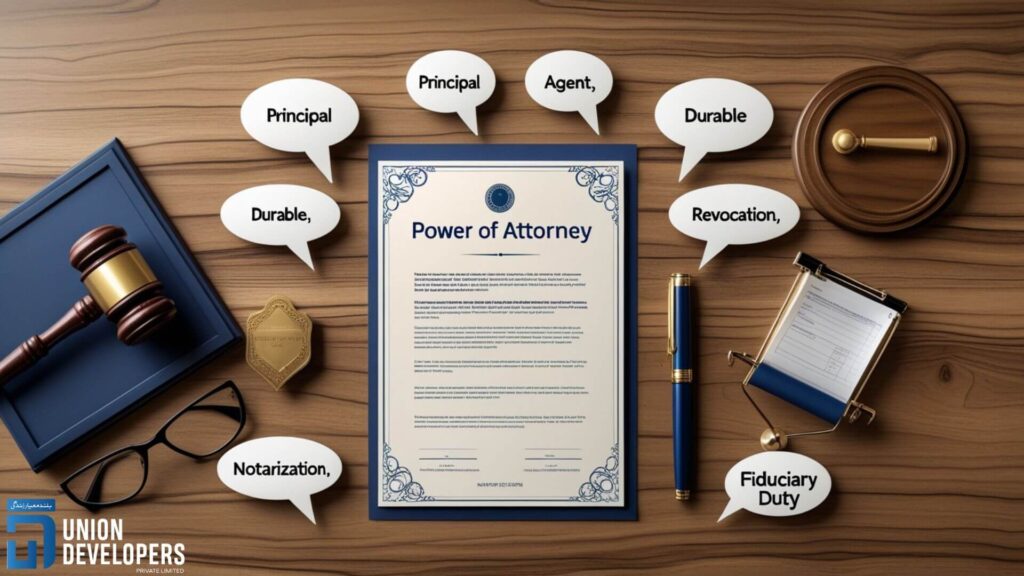
1. Principal/Grantor or Donor
This is a person who grants the authority to another person to handle property-related matters on the Principal’s behalf.
2. Agent or Attorney-in-fact
It is a person to whom the Principal has granted the authority according to the terms outlined in the Power of Attorney. Yet, the agents have limited authority to make decisions on the Principal’s behalf.
Types of Power of Attorney in Pakistan?
There are two general types of Power of Attorney in Pakistan, including.
- General Power of Attorney
- Special Power of Attorney
General Power of Attorney
This type of Power of Attorney for property grants the agents broad authority to act on behalf of the principal in various matters. However, this type of PoA is not limited to property management, business affairs and financial transactions.
Scope & Recovery
It can be comprehensive, covering a wide range of activities. The general PoA is typically recoverable & the principal can cancel it at any time.
Special Power of Attorney
As compared to the general power of attorney, this type of authority is only limitedly granted to the agent. It is a specific or limited type in which the agents are only allowed to make decisions on behalf of the principal in specific situations.
Conditions Where Special PoA is Used?
In certain situations, a special letter of attorney is normally used.
- To designate a specific agent to maintain or sell your property in your absence.
- To authorize a family member to take care of your property when you are abroad.
- To give someone legal authority to look after your family in case you are unwell or going on a trip.
Power of Attorney for Overseas Pakistanis
Most Pakistanis who live outside, whether permanently or temporarily, own or have properties in Pakistan. Thus, they can’t travel back and forth between Pakistan and their home country each time they need to complete a real estate deal.
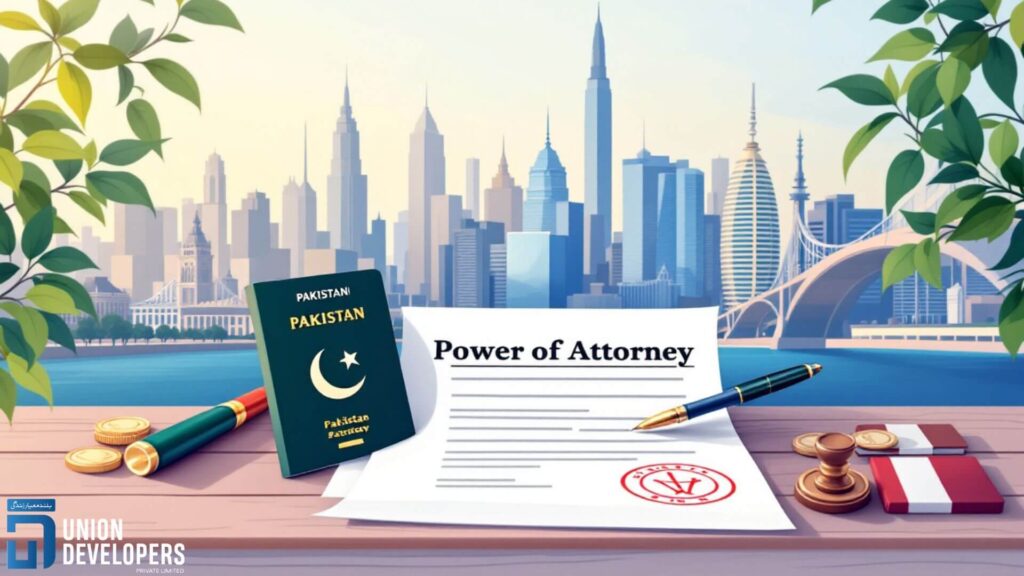
In such a situation, they choose a legal option and authorize someone who take care of & manage all the aspects of the property. So, the designated agent handles property on their behalf with a letter of attorney.
Special Power of Attorney for Overseas Pakistanis
As we discussed at the start, this type of attorney is valid for a specific task that an attorney-in-fact can perform in their absence. For instance, if the principal is overseas & wants to sell their property in Pakistan, then they can authorize a special PoA for the property just for selling the property.
Thus, the agent will be able to sell the principal`s property & represent the grantor in documentation regarding the sale process. Besides, the agent is also responsible for performing the property registration task in Pakistan.
Legal Requirements for PoA for Property in Pakistan
In Pakistan, a Power of Attorney for property requires the following legal documents.
- Original and photocopy of the P0A document.
- Originals and photocopies of the principal’s passport or Computerized National Identity Card (CNIC) / NICOP.
- Two passport-size photographs of the principal.
- Original CNIC or NICOP of the agent and witnesses.
- Application form to attest the power of attorney.
- Processing fee.
- Registration fee (usually 1% of the property value).
For your information: The signatures of the principal & agent must be notarized by an Oath Commissioner.
Process of Power of Attorney for Property in Pakistan
The process involves the following 4 easy steps.
Step 1: Drafting Power of Attorney
The PoA for property registration in Pakistan starts by drafting the attorney, and outlining the authority granted to the designated agent. This document should be printed on official stamp paper (costs ranging from PKR 500 to PKR 5,000).
Remember: For powers to sell property, a specific stamp paper (PKR 5,000) is required, & registration with the registrar is mandatory.
Step 2: Attestation of Attorney
A power of attorney must be signed by the principal (the person granting the power). Despite making sure the signature must be attested by a notary public, court judge, magistrate, Pakistan Consul/Visa-Consul, or a representative appointed by the Federal Government.
Step 3: Registration of PoA
For a property transaction, the PoA needs to be registered with the sub-registrar’s office. Thus, it involves presenting the original documents & paying the required fees.
So, the registration process includes verifying the attorney`s identity & the principal`s consent to prevent any fraud.
Remember: For general power of attorney, registration with the relevant authorities in Pakistan is also required.
What is the Registration Fee for PoA in Pakistan?
The fee for power of attorney depends on several factors. It will cost around PKR 10, 000 to obtain your Attorney’s letter, if registered with the legal agency. Notably, there is no fee for PoA if the agent is a blood relation of the principal.
Despite this, the value of property always determines the Attorney’s registration fees. The registration fee is 1% of the value of the property, including 2% tax on the registration fees as well.
Digital Power of Attorney for Overseas Pakistanis
The government of Pakistan has created an online portal for overseas Pakistanis to register their digital PoA for property. Those Pakistanis who can’t come to Pakistan to handle their legal matters can visit NADRA`s Online Portal for PoA and apply for the registration of PoA or Mukhtar Nama.
For your information, The steps of online registration have already been mentioned on NADRA`s PoA online portal.
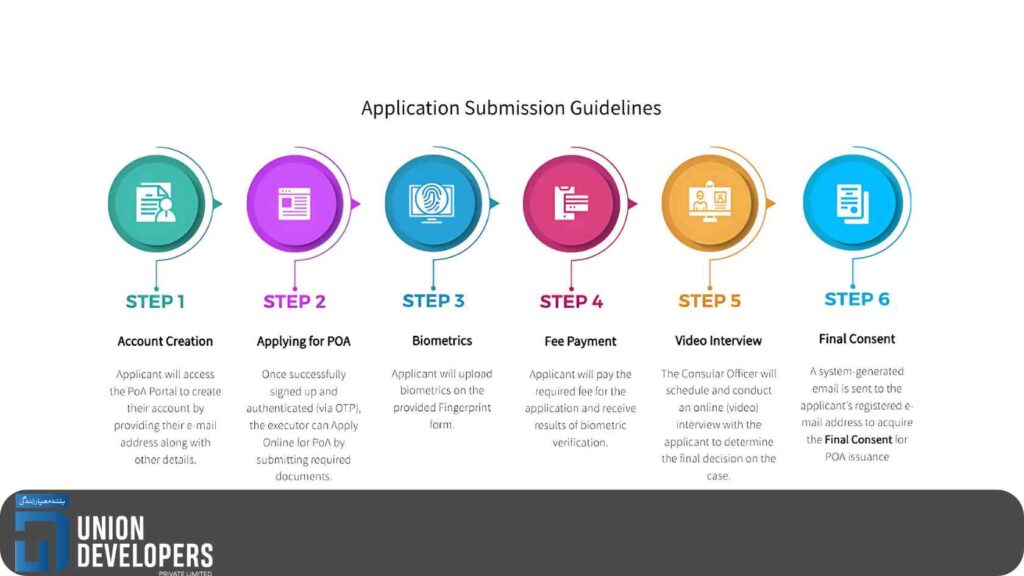
What are the Legal Considerations for Power of Attorney for Property?
There are some legal considerations, every individual must know while registering PoA for property.
- The POA must be in writing and signed by the principal.
- It needs to be witnessed by two individuals present when the principal signs.
- Certain people cannot be witnesses, such as the agent or their spouse/partner, the principal’s spouse/partner, or a minor.
- The principal must be of sound mind and have the intellectual capacity to grant the POA.
- The POA can be limited in time, such as only being effective during a specific period.
- The principal can revoke or cancel the POA at any time unless it is with consideration.
- Revocation should be documented in writing and delivered to the agent and any third parties involved.
Benefits of Power of Attorney for Property in Pakistan
When it comes to property matters, a PoA for property in Pakistan offers the following benefits.
A PoA allows the agent to handle property-related transactions, including the selling, buying property & other matters of the owner`s property.
Moreover, it allows the designated agent to manage the property maintenance, including renovations & improvements.
It enables the principal to streamline the property’s financial matters like regularly paying property taxes, utility bills, etc.
Final Thoughts
After in-depth information, let’s sum up the details. A power of attorney for property in Pakistan is legal evidence allowing someone to act on your behalf in a situation when you are unable to manage your property matters personally.
By properly drafting, attesting, and registering your Power of Attorney (PoA), you ensure your property is managed in accordance with you & prevents misuse.


